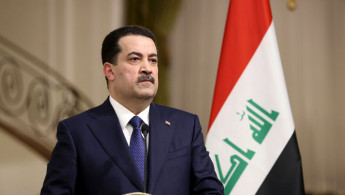US-Iraq defence relationship part of talks in Washington next week, State Department official says
The security and defence relationship between the US and Iraq will be an important part of talks when Iraqi Prime Minister Mohammed Shia Al-Sudani visits Washington next week but is not the primary focus of the visit, a senior State Department official said on Thursday.
The official, who briefed reporters on condition of anonymity, said the emphasis of Al-Sudani's visit would be economic ties, even as Washington and Baghdad are in talks over ending the US-led military coalition in the country.
US forces and Shia Muslim armed groups have engaged in tit-for-tat attacks in recent months amid a regional escalation linked to Israel's war on Gaza, leading to Al-Sudani in January announcing his intention to end the US military presence.
The senior State Department official said the defence and security relationship will be part of the discussions during Al-Sudani's visit, when he will meet both with President Joe Biden and Secretary of Defence Lloyd Austin as well as Secretary of State Antony Blinken.
"[It is] likely to be a very important part of our – of the discussion," the official said.
"It is not the primary focus of the visit… but it is almost certainly going to come up."
The visit's focus will instead be the economy and issues including education, environment, and US support for development, the official said, without providing details.
"We're going to have a full range of discussions about our relationship and where it's going," the official said.
The US invaded Iraq in 2003 to topple Saddam Hussein and withdrew in 2011, only for troops to return in 2014 to help fight the Islamic State group after the extremist Sunni Muslim militant group overran large parts of the country.
Washington and Baghdad began talks in January to reassess the US-led military coalition presence there.
The official said those talks were likely to lead to a second joint security cooperation dialogue later this year.
(Reuters)





 Follow the Middle East's top stories in English at The New Arab on Google News
Follow the Middle East's top stories in English at The New Arab on Google News


